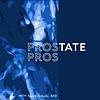
PROSTATE PROS
Mark Scholz, MD
Prostate cancer is complex. Patients often struggle to find accurate, stage-specific information. Listen as prostate specialist and author, Mark Scholz, MD guides you through the 15 stages of prostate cancer, recent updates, and all possible treatment options. Avoid prostate cancer pitfalls and take control of your diagnosis with the PROSTATE PROS podcast.
Categories: Education
Listen to the last episode:
PROSTATE PROS Series Finale On the last episode of the PROSTATE PROS podcast, Dr. Scholz and Liz recap important themes and talk about what’s new in prostate cancer, including Lutetium-177 and Orgovyx. Dr. Scholz: [00:03] We’re guiding you to treatment success and avoiding prostate cancer pitfalls. I'm your host, Dr. Mark Scholz. Liz: [00:09] And I'm your cohost, Liz Graves. Dr. Scholz: [00:13] Welcome to the PROSTATE PROS podcast. Liz: [00:15] We have a bit of a sad announcement to make, as this will be the last episode of the PROSTATE PROS podcast. Dr. Scholz and I have really enjoyed working on this project and we've covered so many important topics surrounding prostate cancer and men's health. So for this last episode, we're going to recap some important themes and talk about some promising new therapies. So Dr. Scholz, on our very first episode, we talked about how important it is to find the right treatment team. This is something that's come up again and again and again. What are some tips you have for newly diagnosed men trying to find their doctors? Dr. Scholz: [00:53] I think what's confusing is how much of the responsibility falls on the shoulders of patients. The prostate industry is a very powerful multi-billion dollar industry, and there is a lot happening really fast. When patients are diagnosed, they're not in a thoughtful perspective, they're in an action mode, they're frightened. It is hard to sort out who to listen to and who to stay away from. This process can be aided by family members, primary care doctors, oncologists, and of course, online resources and books. I try to provide some of that information in the book, The Key to Prostate Cancer, but the process, if it was easy, we could give you one simple answer. It is not a simple process. Liz: [01:46] One thing that we've talked about is to get a quarterback. So this is a doctor that isn't the treating doctor necessarily, but it’s someone that will oversee the treatment and work with the other teams of doctors. This is something I hear you doing Dr. Scholz, you're always talking to other doctors about patients and kind of networking with them to make sure that the patient is getting the best care, even when they're not in our office. Dr. Scholz: [02:12] I think the issue that you're relating to is that many of these physicians have a conflict of interest. You're asking them, what should I do? But they're a surgeon or they're a radiation doctor. And as a medical oncologist, I'm neither of the above. This is somewhat uncommon, but you can recruit your urologist or your radiation doctor to help you by explaining at the outset that, “you, sir, will not be my treating doctor, but I definitely need your aid and your assistance in picking the right doctor.” Liz: [02:43] Now you may be thinking that you have cancer and you don't have time to see all these people, but as we've mentioned, prostate cancer is slow growing. So really taking that time to find the right doctor for you is crucial. Dr. Scholz: [02:56] Just yesterday, I saw a very sophisticated new patient who was feeling the rush job, the sense that the clock is ticking, and he did have a Gleason 9. We consider that the High-Risk category of prostate cancer. But, the idea that you have to make a decision within days or weeks is never substantiated by the literature and the science. Patients can take several months to sort out what they want to do. This sort of careful thoughtful process pays off in the long-term with better results. Liz: [03:29] So patients really need to take it under their control. One of the things is to educate themselves. In the past couple of years, there's been a huge shift towards imaging. &nb
Previous episodes
-
24 - That’s a WrapMon, 03 May 2021
-
23 - Friendly Reminder: Replace the Random Biopsies!Mon, 05 Apr 2021
-
22 - The Brief on PSAMon, 01 Mar 2021
-
21 - Do I Have Prostatitis?Mon, 01 Feb 2021
-
20 - Considering Prostate Cancer Clinical TrialsSun, 03 Jan 2021
-
19 - Prostate Cancer Spotlights in 2020Mon, 07 Dec 2020
-
18 - PSMA Imaging Detects Prostate Cancer SpreadMon, 02 Nov 2020
-
17 - Time to Address TestosteroneMon, 05 Oct 2020
-
16 - Supplements to Treat Prostate CancerTue, 01 Sep 2020
-
15 - Off-label Treatment Used for Prostate CancerMon, 03 Aug 2020























